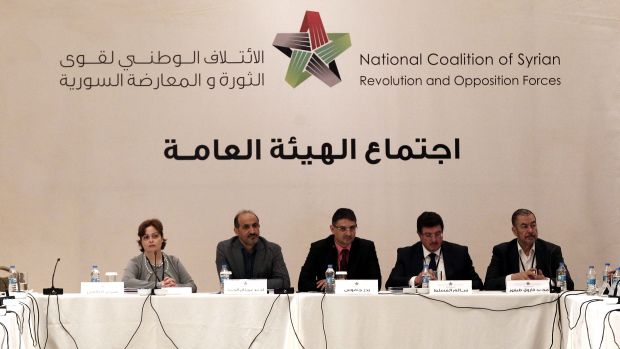
Syrian National Coalition member Suheir Atassi, head Ahmad Jarba, secretary-general Badr Jamous, member Salim Muslit and Leader of the exiled Syrian National Council Muhammet Faruq Tayfur during a Syrian opposition groups meeting in Istanbul, Turkey, on November 9, 2013. (EPA/SEDAT SUNA)
The conference, dubbed “Geneva II,” has been denounced by several armed opposition groups, with some saying participation by any members of the opposition amounts to “treason.” The Syrian National Coalition has agreed to attend in principle, provided that their preconditions are met, including the agreement of rebel fighters inside Syria.
Speaking to Asharq Al-Awsat at a press conference in Istanbul, Coalition head Ahmed Al-Jarba said: “I am confident that we will reach a solution that is acceptable to all. A committee was formed by the Coalition which will meet in the next few days with representatives of the fighting brigades to resolve contested issues.”
In response to a question about the stance of Islamist factions within the opposition—which recently announced that attendance of Geneva II without a guarantee that Syrian president President Bashar Al-Assad would step down was a “conspiracy against the Syrian revolution”—Jarba said: “We too demand the departure of Assad and I am convinced that we will agree with the fighting factions in the end. We will reach a unified decision with them about Geneva II.”
At the same press conference, the Coalition announced its plans for an interim government in rebel-held territory. Jarba said: “We hope that you will see that the government will be effective on the ground and inside Syria.”
Ahmad Tomeh, who was selected by the Coalition as Interim Prime Minister in the new government, said it was a launch-pad for the “era of a new Syrian Republic,” and urged the Syrian people to support it.
He thanked Saudi Arabia for supporting the Syrian people and thanked Qatar, Turkey, Gulf States and Libya for providing help to the opposition. He said “our transitional government will pave the way for the return to Syria, and we will fight our battle on all levels,” adding that “we will do our utmost to rebuild Syria and we will respect all international charters and treaties.”
Tomeh said the fact the interim government was working from Turkish territory while the Assad regime controlled most Syrian cities would not deter him and that “the authority of the regime is in decline and [the formation of] this government means that the revolution now has its institutions and will move to the liberated areas soon.”
“We have three priorities, the most important of which is to open humanitarian channels to deliver aid to the besieged areas, second, the release of detainees, and third, the establishment of a transitional governmental body,” he added.
In regards to the Geneva II, Tomeh said that the opposition’s precondition of a guarantee of Assad’s departure was no longer a priority for countries backing conference.
However, Ahmad Ramadan, a prominent member of the Syrian Coalition executive body, accused the Syrian government of trying to undermine the Geneva II conference with Russian and Iranian assistance.
Ramadan said: “The Syrian regime was being elusive and will not simply hand over power to a transitional body, and therefore the continuation of the Syrian revolution inside [Syria] is the only solution which will force the regime to leave.”
